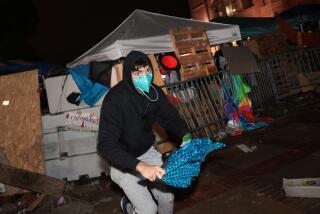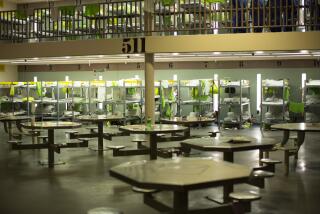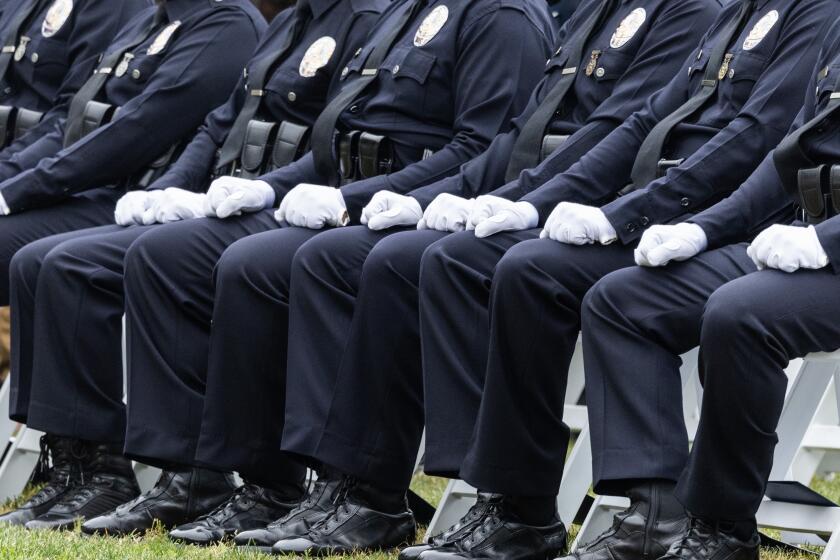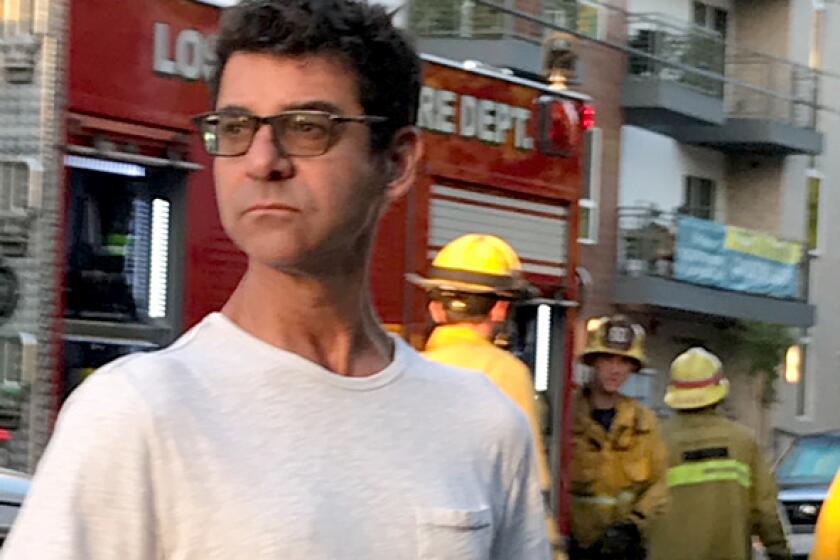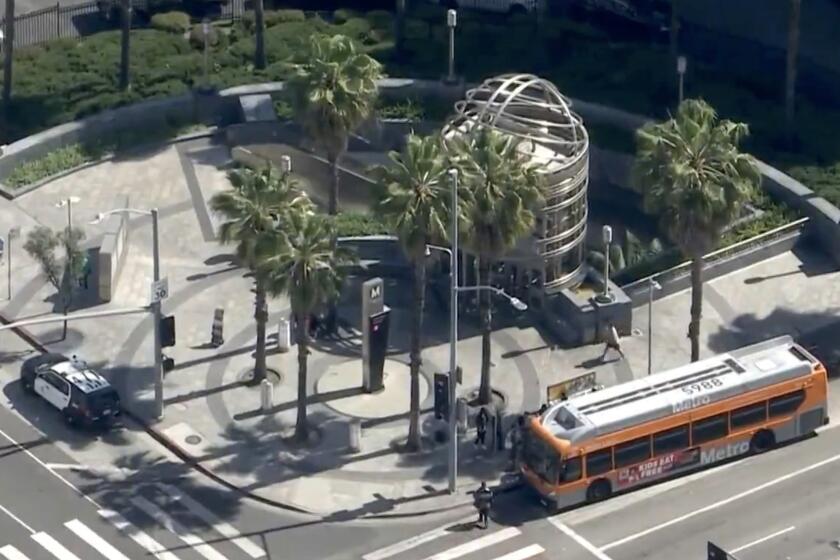Mason Prepares to Die in Gas Chamber : Execution: Condemned man spends last day with his family. Officials saw no sign he wanted to reinstate appeals.
David Edwin Mason, the convicted killer of five who volunteered for the gas chamber, held firm to his vow not to halt his execution as he said farewell to his family and prepared to die just after midnight this morning.
As the hour of his scheduled death drew near, Mason’s lawyer and officials at San Quentin prison said there was no sign he was going to back out at the last moment and reinstate his federal court appeals.
“There has never been an indication he’s going to change his mind,” said Don Lindsey, a spokesman for the prison.
At 4 p.m. Monday, the U.S. 9th Circuit Court of Appeal cleared the way for Mason to be put to death when it lifted a stay of execution imposed while the court considered whether Mason was comptent to choose to die.
An 11-judge panel of the 9th Circuit upheld two earlier court rulings that Mason was mentally competent and ruled: “All stays in the circuit and district courts are hereby vacated.”
The ruling left only the slim chance that Charles Marson, Mason’s former lawyer who brought the last-ditch challenge, could win a delay from the U.S. Supreme Court. In recent years, the court has repeatedly rejected last-minute stays aimed at saving condemned prisoners.
Mason, who strangled and robbed four elderly Oakland residents in 1980 and strangled a fellow jail inmate in 1982, is the first prisoner in California to volunteer for his execution since capital punishment was restored. In doing so, he was willing to cut his life short by at least three years.
Until now, the only prisoner put to death in California in the last 26 years was Robert Alton Harris, a convicted murderer who died in the gas chamber in April, 1992.
This year, Mason went to court and won the right to fire Marson as his attorney and to drop his federal court appeals. During a decade in prison, Mason explained, he had come to regret his crimes and realize that his death sentence was appropriate.
State officials said Mason could stop his execution at any time--even when he was strapped into the chair in the gas chamber--simply by saying he wanted to reactivate federal court review of his conviction.
“All he neeeds to do to stop the execution is say, ‘I want to stop the execution,”’ said Dep. Atty. Gen. Catherine Rivlin. “We’ve agreed all along that he can have a first petition (in federal court) if he wants it.”
Just in case he were to change his mind, prison officials said Mason would have a phone in his cell and would be able to call his current attorney, Mike Brady, who would be sitting in an office at the prison.
Brady, in turn, was prepared to contact U.S. District Judge Ronald M. Whyte, who was standing by in case Mason wanted him to issue a stay of execution.
Mason, who grew up in a strict religious household where he was frequently beaten and repeatedly tried to commit suicide, appears to have found strength in recent months in renewed family relationships.
Mason spent much of the day Monday with his parents, his wife, Charlene, who he married while in prison, and other members of his family. Instead of having the traditional last meal in his cell, Mason and his family dined during the afternoon on sandwiches provided by the prison.
At 6 p.m., he was scheduled to leave his family and be escorted to one of two death watch cells 15 feet from the gas chamber. He would be given a clean set of clothes and remain under constant watch until being walked into the gas chamber.
Mason had decided against the company of a spiritual adviser during his final hours, asking instead for access to a telephone. Prison officials said he would be able to phone his attorney at any time, but had not decided whether he would be allowed to make other calls.
All other inmates at San Quentin were confined to their quarters, except at mealtime. “Institutional-wise, it’s a very quiet day for David Mason and the staff here,” said Lindsey, the prison spokesman.
Mason said he did not want any members of his family to witnesses his execution, preferring they remember him as they saw him on their last visits.
Similarly, no relatives of his victims were on hand to watch the execution.
Dolly Lundberg, whose mother, 71-year-old Joan Pickard, was Mason’s first victim, said she forgives him for his crimes but still believes he should be put to death.
“Very definitely it is a necessary and right thing to happen,” Lundberg said from her home in Castro Valley. “There have been plenty of appeals. He’s had plenty of time to prove his innocence and he hasn’t been able to.”
Lundberg said she wondered whether Mason’s resolve to die would hold until the final minute, or whether he would back out.
“As individuals, we can’t judge another and we must forgive,” said Lundberg, whose family attended the same Pentecostal church as the Masons. “Our prayers are with his family. At least they are getting a chance to say goodbye. Unfortunately I didn’t.”
Foes of capital punishment, holding out hope that Mason would change his mind, planned to stage vigils at the prison and in major cities throughout the state. But opposition to Mason’s execution has not been as great as the protests last year when the state executed Harris.
Pat Clark, executive director of Death Penalty Focus, said she expected 1,500 people to participate in protests statewide Monday night--fewer than the number that turned out just at San Quentin when Harris was executed.
“For the abolitionists, a consensual execution is a difficult one,” Clark said. “It’s strange to be viewed as the people against David Mason. Our view is no one should be killed.”
BACKGROUND
After the execution of Robert Alton Harris in the San Quentin gas chamber last year, the California Legislature passed a law allowing condemned prisoners to choose to die by gas or lethal injection. However, David Edwin Mason, contending that is was the state’s responsibility to decide how to kill him, chose neither method. As a result, the law provides that Mason die in the gas chamber.
More to Read
Start your day right
Sign up for Essential California for news, features and recommendations from the L.A. Times and beyond in your inbox six days a week.
You may occasionally receive promotional content from the Los Angeles Times.
